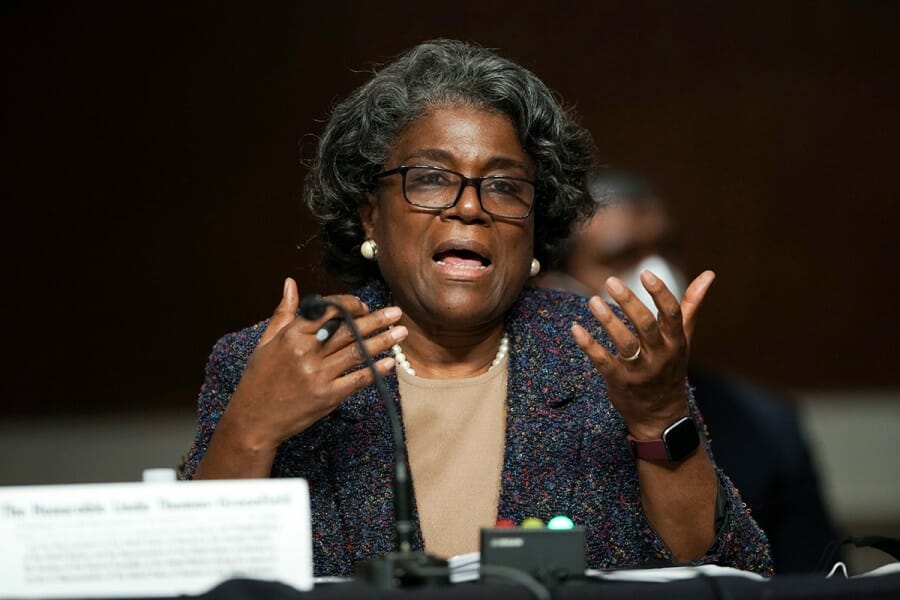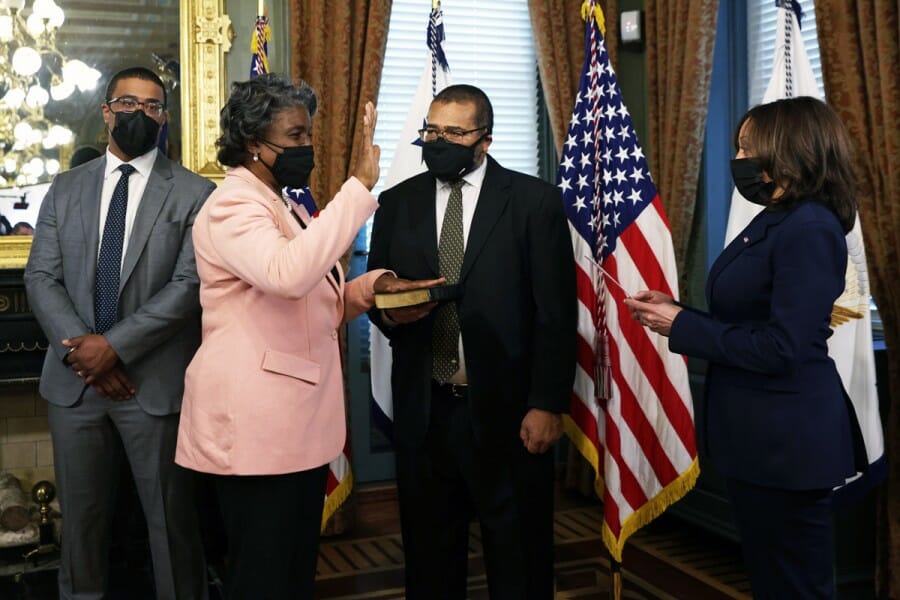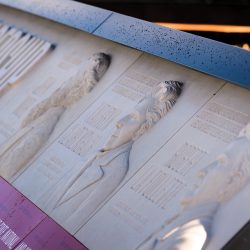The Art of Gumbo Diplomacy
New UN ambassador Linda Thomas-Greenfield MA'75 shares her secret recipe for fostering international dialogue: empathy, patience, UW idealism, and homemade soup.
It’s Tuesday, December 29, 2020, in Arlington, Virginia. The election was eight weeks ago, the COVID-19 pandemic rages on, and Americans have never been more excited to ring in a new year. Linda Thomas-Greenfield MA’75 is waiting at home for a ride from her daughter, Lindsay.
It’s a nice night, about 37 degrees and clear — a stark contrast to the six-inch blustery blizzard blanketing Madison. Lindsay arrives, and Linda hops into the car. The Zoom call that Linda’s taking on her iPhone automatically connects to the car’s Bluetooth, and it takes a bit of fumbling to get it back to the phone’s speaker. It’s rush hour — 5:05 p.m. eastern time — but traffic is pretty light. The two are going to have dinner with the other members of their “bubble”: Linda’s son, Lafayette, and his family. By all accounts, it’s a perfectly average family on a perfectly average night.
Only this family is far from average, especially its matriarch. For she’s Ambassador Thomas-Greenfield, and in two months, she will be confirmed by the U.S. Senate to serve in President Biden’s cabinet as the U.S. ambassador to the United Nations. One of the first cabinet picks announced on November 24, 2020, her nomination was met with resounding applause from diplomats and leaders across the globe.
This is not Thomas-Greenfield’s first time in a presidential administration. Under George W. Bush, she held the post of U.S. ambassador to Liberia. Beginning in 2013, she served the Obama administration as the assistant secretary for the Bureau of African Affairs. She held that position through 2017, when it was eliminated by the Trump administration in a downsizing effort.
Thomas-Greenfield received her master’s in political science. The All Ways Forward comprehensive campaign raises funds for fellowships to support graduate students.
Thomas-Greenfield is a proud career diplomat, but it’s certainly not the direction she had anticipated her life would take. Her dream was to be a lawyer; it’s the first thing she remembers wanting to be when she grew up. While that dream may have changed over time, UW–Madison recognized her excellence and service with an honorary doctor of laws in 2018.
Excellence and service run in the family: Thomas-Greenfield met her husband, Lafayette Greenfield, while they were both working in Liberia as foreign service officers for the U.S. Department of State. Lindsay followed in their footsteps and now works as a foreign service specialist stationed in La Paz, Bolivia. She’s home for the holidays, but heads back overseas tomorrow (thus Tuesday night’s family dinner). And son Lafayette II realized his mom’s childhood dream and earned his law degree from Howard University in 2013. He is now a partner at a DC firm.
Raising a family while in the foreign service wasn’t an easy feat, but Thomas-Greenfield excels at transitions. “Studies have shown that the most stressful time in a person’s life is when they’re moving from one place to another,” she says. “As foreign service diplomats, we have these stresses every two to three years.”
Perhaps her most challenging move, she recalls, was relocating to Pakistan from Kenya. “Me, too!” Lindsay chimes in from the driver’s seat. Mother and daughter share a quick aside, tallying up the places Lindsay has lived.
“Maybe seven?” Lindsay thinks. “No,” says Linda. “You lived in Nigeria, the Gambia, Kenya, Pakistan, and Switzerland with me.”
“And Lima!”
“Oh, she was in Lima, Peru!”
Linda transitions back to her Zoom call and, like a proud parent, adds, “And then she joined the foreign service and went to DRC Congo, and is now serving in La Paz.”
Amid all of these transitions, it was important to keep the family grounded. No matter where they were, every year the whole family would return to the U.S. and Thomas-Greenfield’s home state of Louisiana. There the children could connect with their family, grow up knowing their relatives, and develop a sense of rootedness.
Thomas-Greenfield was born in Baker, Louisiana, in 1952. The population at the time was shy of 5,000. As she described in a 2018 TEDx Talk, “We’re in the Deep South. I’m in a segregated town in which the KKK regularly would come on weekends and burn a cross in somebody’s yard.” Graduating from high school was bold for Thomas-Greenfield, and not just because she was bused every day past two all-white, better-funded high schools to get to her own.
Her mother had gone to school only through eighth grade. Her father left school in third grade so he could work. “He couldn’t read or write,” she said in the TEDx Talk, “but he was the smartest man I knew.”
After graduation in 1970, Thomas-Greenfield made another bold move by attending Louisiana State University (LSU). She was not wanted there: LSU “had to be forced” by court order to accept nonwhite students. “I was entering a hostile environment,” she said. Among the students on campus alongside her was David Duke, who became grand wizard of the KKK.
It was natural, Thomas-Greenfield says, to expect overt racism in the South. When she came to Madison for her graduate work, she assumed that racism wouldn’t be an issue.
“It was, for me, the first time I was in a community in which at least I believed that race was not a factor,” she reflects.
But she quickly learned that her assumptions were wrong. “There had been a football game, and you know how crazy State Street can be after a football game. I was walking out of the library and walked up to State Street. I was standing on the corner waiting to cross the street, and somebody passed by in a car, called me the N-word, and sprayed me with a water gun,” Thomas-Greenfield recalls.
In the car, her daughter is silent.
“That was the most devastating experience I’ve ever had. … I wouldn’t have been devastated if that had been in Louisiana, because you always expect it. In Wisconsin, I didn’t expect that. It really took my breath away to have that happen in Madison.”
Thomas-Greenfield cautions current UW students of color to be prepared: “Racism exists everywhere. They need to be prepared for it, but they should not let it stifle them. … My feeling about racism is it’s not my problem, as much as it is the problem of the person who is the racist. Don’t take their problem and make it into your problem.”
The transition from Louisiana to Madison was so stark, it reminds Thomas-Greenfield of the cultural shift she experienced moving from Kenya to Pakistan. “I had to adjust to being comfortable in a white world,” she says. “A friend of mine [from the UW] just sent a picture of us from Madison, and it was just me as the only Black person. Every other person was white. My friends were like, ‘Where are the Black people in that picture, Linda?’ And I’m like, ‘You saw the Black people, it was me!’ ”
As Linda and Lindsay drive, the conversation shifts from the past to the future. For people across the world, 2020 was a year of massive transitions: working in offices to working remotely, in-person gatherings to virtual events, being employed to being jobless. And just three weeks after this car ride will come the monumental shift from a Trump administration to a Biden administration in the White House.
Where, exactly, will she start? “You start by engaging,” explains Thomas-Greenfield.
“Humbling yourself,” Lindsay adds, and Linda agrees.
“I think there will be a tremendous amount of humility that we have to bring to the table. It’s going to require a lot of effort.”
Effort and humility aren’t the only things Thomas-Greenfield will bring to the table; in fact, what she literally brings to tables across the world is what helped put her diplomacy on the map: gumbo.
Breaking bread is a diplomatic method that’s about as old as time. Whether it’s breaking bread or breaking crab legs, the method is simple, but effective. Step one: invite everyone over. Step two: share a meal — and realize you have more in common than not. Thomas-Greenfield adopted this method during her 35-year tenure in the foreign service, cooking her famous gumbo with leaders and diplomats across four continents.
“I called it gumbo diplomacy,” she said in her November nomination-acceptance speech. “Wherever I was posted around the world, I invited people of different backgrounds and beliefs to … make homemade gumbo. It was my way of breaking down barriers, connecting with people, and starting to see each other on a human level. That’s the charge in front of us today.” •
Chelsea Rademacher ’13 is a contributing writer for On Wisconsin and was honored to virtually share a car ride with Linda and Lindsay.
Published in the Summer 2021 issue




Comments
Rebecca June 19, 2025
Great story – I did not know Amb Linda Thomas Greenfield went to Madison. My child who is at Madison now, like the Ambassador’s children, is a foreign service child. The children serve as much as their parents as they have to adjust from place to place every few years, navigate each country and new schools differently. She’s now happily found a home at UW. Thanks for including this article in the newsletter.